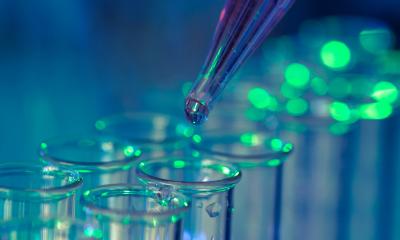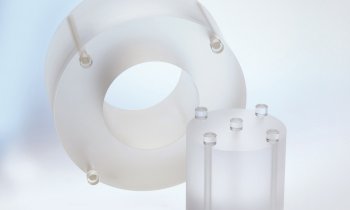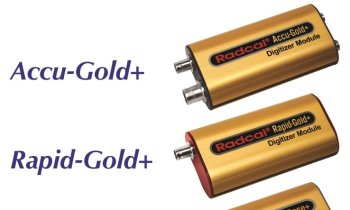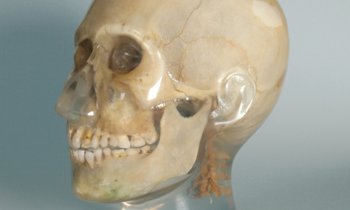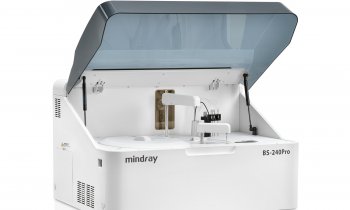News • Coronavirus disease biomarkers
New Covid-19 testing method gives results within one second
The Covid-19 pandemic made it clear technological innovations were urgently needed to detect, treat, and prevent the SARS-CoV-2 virus. A year and a half into this epidemic, waves of successive outbreaks and the dire need for new medical solutions — especially testing — continue to exist.
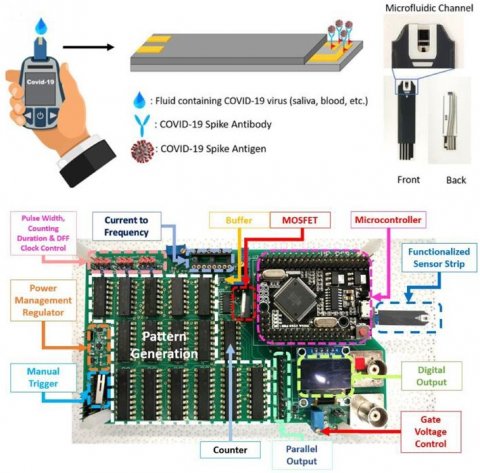
Image credit: Minghan Xian, Hao Luo, Xinyi Xia, Chaker Fares, Patrick H. Carey IV, Chan-Wen Chiu, Fan Ren, Siang-Sin Shan, Yu-Te Liao, Shu-Min Hsu, Josephine F. Esquivel-Upshaw, Chin-Wei Chang, Jenshan Lin, Steven C. Ghivizzani, and Stephen J. Pearton
In the Journal of Vacuum Science & Technology B, researchers from the University of Florida and Taiwan’s National Chiao Tung University report a rapid and sensitive testing method for Covid-19 biomarkers.
The researchers, who previously demonstrated detection of biomarkers relevant in epidemics and emergencies, such as the Zika virus, heart attacks, and cerebral spinal fluid leaks, leveraged their expertise to develop a sensor system that provides detection within one second, which is far faster than current Covid-19 detection methods. “This could alleviate slow Covid-19 testing turnaround time issues,” said Minghan Xian, an author and a chemical engineering doctoral candidate at the University of Florida.
Detecting the presence of the virus requires amplifying the numbers of the biomarker, such as the copies of viral ribonucleic acid in the common polymerase chain reaction technique for Covid-19 detection, or amplifying the binding signal for a target biomarker. The group’s method amplifies the binding signal for a target biomarker. “Our biosensor strip is similar to commercially available glucose test strips in shape, with a small microfluidic channel at the tip to introduce our test fluid,” said Xian. “Within the microfluidic channel, a few electrodes are exposed to fluid. One is coated with gold, and Covid-relevant antibodies are attached to the gold surface via a chemical method.”
The system can serve as a prototype for modularized, inexpensive protein biomarker sensors for expedient real-time feedback within clinical applications, operating rooms, or home use
Minghan Xian
During measurement, sensor strips are connected to a circuit board via a connector, and a short electrical test signal gets sent between the gold electrode bonded with Covid antibody and another auxiliary electrode. This signal is then returned to the circuit board for analysis. “Our sensor system, a circuit board, uses a transistor to amplify the electrical signal, which then gets converted into a number on the screen,” said Xian. “The magnitude of this number depends on the concentration of antigen, the viral protein, present within our test solution.”
While the system’s sensor strips clearly must be discarded after use, the test circuit board is reusable. This means the cost of testing may be greatly reduced. The versatility of this technology goes far beyond detecting Covid-19. “By altering the type of antibodies attached to the gold surface, we can repurpose the system to detect other diseases,” said Xian. “The system can serve as a prototype for modularized, inexpensive protein biomarker sensors for expedient real-time feedback within clinical applications, operating rooms, or home use.”
Source: AIP Publishing
19.05.2021





